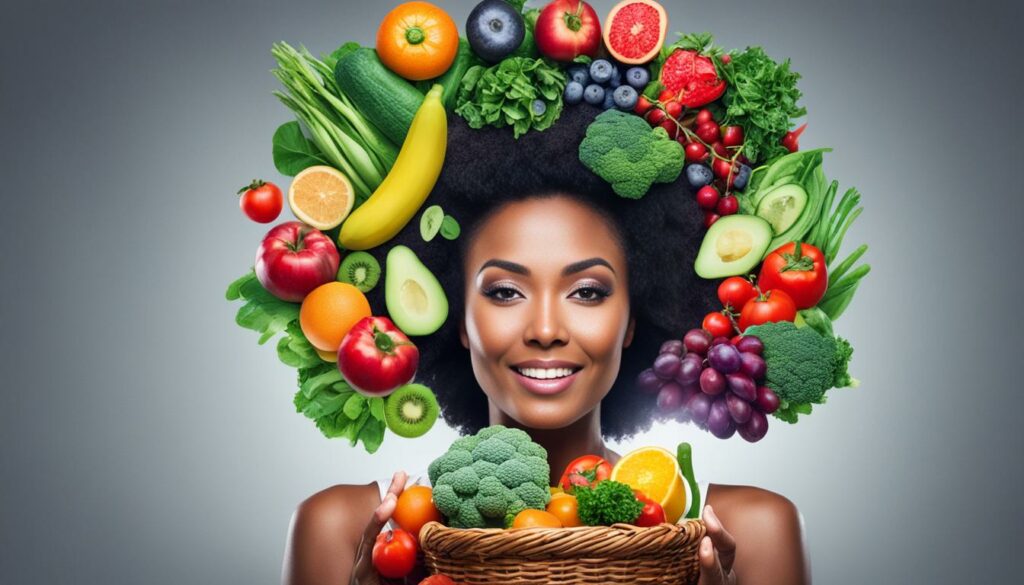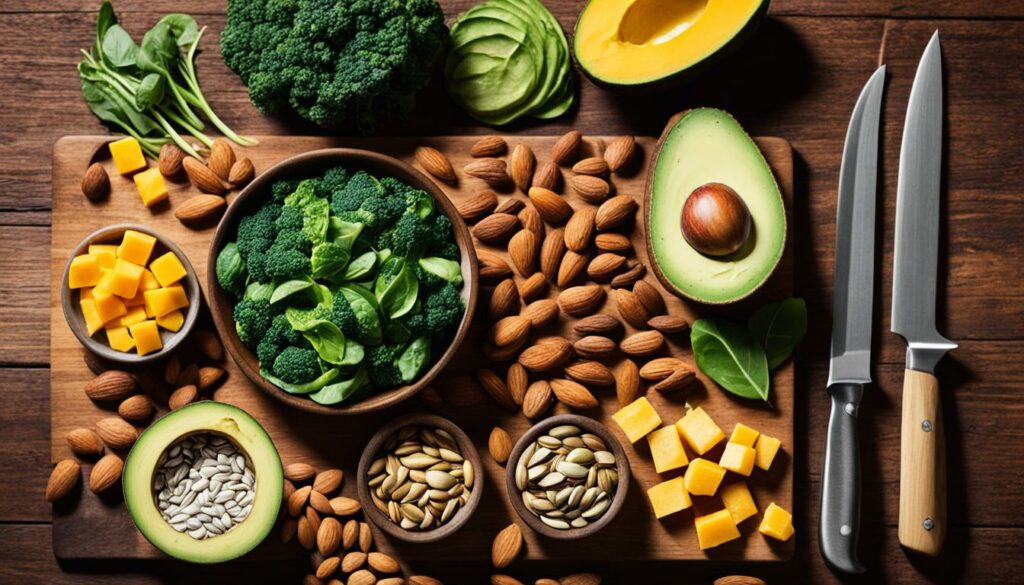Vitamin E plays a crucial role in supporting sexual health and fertility in both men and women.
Scientific research has shown the various benefits of vitamin E supplementation for reproductive well-being.
It helps improve menstrual disorders in women, thickens the uterine lining, and can even treat conditions like polycystic ovary syndrome (PCOS).
In men, vitamin E increases sexual desire, sperm count, and sperm motility. It can also enhance the success rate of in vitro fertilization.
Key Takeaways:
- Vitamin E is essential for sexual health and fertility in both men and women.
- It can improve menstrual disorders and treat conditions like PCOS in women.
- Vitamin E increases sexual desire, sperm count, and sperm motility in men.
- It can enhance the success rate of in vitro fertilization.
- Consult with a healthcare professional for specific dosage recommendations.
The Benefits of Vitamin E for Women’s Fertility
Vitamin E offers several benefits for women’s reproductive health and fertility. This essential nutrient plays a vital role in maintaining overall wellness and supporting the female reproductive system.
One of the significant advantages of vitamin E is its ability to regulate menstrual disorders. Irregular cycles, menopausal symptoms, and discomfort like abdominal and back pain can be improved with vitamin E supplementation.

Vitamin E also helps thicken the lining of the uterus, enhancing the chances of successful conception.
It creates a favorable environment for implantation, ensuring the embryo’s proper development.
Furthermore, women with conditions like polycystic ovary syndrome (PCOS) can benefit from vitamin E supplementation.
Vitamin E helps restore hormone balance, addressing the underlying hormonal imbalances that contribute to PCOS symptoms.
Moreover, vitamin E acts as a protective shield for the amniotic fluid during pregnancy, reducing the risk of miscarriage. It also supports the treatment of cystic breast disease, providing relief from discomfort and inflammation.
By including vitamin E in your daily routine, you can improve your reproductive health and enhance your overall well-being.
| Vitamin E Benefits for Women’s Fertility |
|---|
| Regulates menstrual disorders |
| Thickens the lining of the uterus |
| Restores hormone balance in women with PCOS |
| Protects the amniotic fluid and reduces the risk of miscarriage |
| Supports the treatment of cystic breast disease |
The Benefits of Vitamin E for Men’s Fertility
Vitamin E is a valuable nutrient that plays a crucial role in men’s fertility and sexual health.
By promoting optimal hormonal balance and supporting reproductive processes, vitamin E offers numerous benefits for men looking to enhance their fertility and overall sexual well-being.
One of the key advantages of vitamin E is its impact on sexual desire. This essential nutrient stimulates testosterone production, the primary hormone responsible for sexual drive in men.
By increasing testosterone levels, vitamin E can help improve sexual desire and enhance overall reproductive health.
Vitamin E also plays a vital role in sperm production and function. Studies have shown that vitamin E supplementation can increase sperm count and improve sperm motility, which refers to the ability of sperm to swim efficiently.
This improvement in sperm count and motility can significantly enhance the chances of successful conception by making it easier for sperm to reach the egg.
In addition to its direct effects on sperm, vitamin E has been found to improve the success rate of in vitro fertilization (IVF) in men.
IVF is a common assisted reproductive technology used to achieve pregnancy when natural conception is challenging. By taking vitamin E supplements, men undergoing IVF treatment may increase their chances of successful fertilization and pregnancy.
Vitamin E: Beneficial for Sexual Dysfunction
Vitamin E supplementation has also shown promise in addressing sexual dysfunction, a common issue that can impact men’s sexual health and reproductive function.
Sexual dysfunction can manifest as erectile dysfunction or difficulties with ejaculation and can significantly affect a man’s ability to conceive.
Research suggests that vitamin E’s antioxidant properties can help protect the cells and tissues responsible for erectile function.
By reducing oxidative stress and promoting healthy blood flow, vitamin E can support optimal sexual function and improve erectile dysfunction in some cases.
“The antioxidant properties of vitamin E can help protect erectile function by reducing oxidative stress and promoting healthy blood flow.”
To reap the benefits of vitamin E for sexual health, it can be taken as a supplement or obtained through a diet rich in vitamin E-containing foods.
Incorporating foods such as wheat germ oil, almonds, and sunflower seeds can help increase vitamin E intake and support reproductive health naturally.
| Food Sources of Vitamin E | Vitamin E Content (per 100g) |
|---|---|
| Wheat Germ Oil | 149.4mg |
| Sunflower Seeds | 35.1mg |
| Almonds | 26.2mg |
| Avocado | 2.1mg |
Source: USDA FoodData Central
However, it’s important to note that vitamin E supplementation should be undertaken under the guidance of a healthcare professional. They can assess your specific needs and recommend the appropriate dosage to support your fertility goals effectively.
By harnessing the benefits of vitamin E for men’s fertility and sexual health, individuals can take proactive steps towards optimizing their reproductive well-being.
Foods Rich in Vitamin E
Incorporating vitamin E into your daily diet is easy with the abundance of vitamin E-rich foods available.
These foods not only provide a natural source of this essential nutrient but also offer a range of flavors and textures to enhance your meals.
By including these vitamin E-rich foods in your diet, you can reap the numerous health benefits associated with this powerful antioxidant.
Plant-Based Sources of Vitamin E
If you prefer a plant-based diet or are looking for vegetarian or vegan options, there are several vitamin E-rich foods to choose from:
- Wheat Germ Oil
- Sunflower Seeds
- Almonds
- Sesame Seed Oil
- Mamey Sapote Fruit
- Avocados
- Hazelnuts
- Pine Nuts
- Turnip Greens
- Kiwifruit
These plant-based sources of vitamin E are versatile and can be used in a variety of dishes. You can drizzle wheat germ oil or sesame seed oil on fresh salads or use them for sautéing vegetables.
Sunflower seeds, almonds, and hazelnuts make great additions to oatmeal, smoothies, or trail mix. Mamey sapote fruit and avocados can be enjoyed on their own or added to breakfast bowls and desserts.
Incorporating turnip greens and kiwifruit into your meals is an excellent way to boost your vitamin E intake alongside other beneficial nutrients.
Animal-Based Sources of Vitamin E
If you include animal products in your diet, there are also animal-based sources of vitamin E to consider:
- Atlantic Salmon
- Rainbow Trout
Both Atlantic salmon and rainbow trout are rich in vitamin E and provide other essential nutrients like omega-3 fatty acids.
These fish can be grilled, baked, or broiled to enhance their natural flavors. Incorporating these vitamin E-rich fish into your diet can contribute to a well-rounded approach to meeting your nutritional needs.
Remember to consult with a healthcare professional to determine the recommended daily intake of vitamin E for your specific needs.
They can help you plan a balanced diet that includes these vitamin E-rich foods and ensure you are meeting your nutritional goals.

| Food | Vitamin E Content (per 100g) |
|---|---|
| Wheat Germ Oil | 149.4mg |
| Sunflower Seeds | 35.17mg |
| Almonds | 25.63mg |
| Sesame Seed Oil | 3.74mg |
| Mamey Sapote Fruit | 1.1mg |
| Avocados | 2.07mg |
| Hazelnuts | 15.03mg |
| Pine Nuts | 9.33mg |
| Turnip Greens | 1.12mg |
| Kiwifruit | 1.46mg |
| Atlantic Salmon | 0.8mg |
| Rainbow Trout | 6.77mg |
How to Incorporate Vitamin E into Your Diet
To ensure you are getting adequate amounts of vitamin E, consider adding a variety of foods rich in vitamin E to your diet.
Vitamin E supplementation is an option, but natural sources are preferred whenever possible. Here are some simple and delicious ways to incorporate vitamin E into your meals:
- Use wheat germ oil or other vegetable oils in cooking. These oils are rich in vitamin E and can be used for sautéing, roasting, or dressing salads.
- Sprinkle sunflower seeds or almonds on salads or snacks. These crunchy additions not only provide a boost of vitamin E but also add texture and flavor to your dishes.
- Include avocados or nut butters in your meals. Avocados are not only a great source of healthy fats but also contain vitamin E. Nut butters, like almond or peanut butter, can be spread on toast or mixed into smoothies for an extra dose of vitamin E.
- Choose vitamin E-rich foods like mamey sapote fruit. This tropical fruit is not only delicious but also packed with vitamin E.
By incorporating these foods into your daily diet, you can naturally boost your vitamin E intake and support your sexual health.
Remember, it’s always important to consult with a healthcare professional to determine the right dosage and the best approach for you, especially if you have specific fertility concerns or deficiencies.
Note: Image added for visual appeal and relevance to the topic of the blog post.
Conclusion
Vitamin E plays a significant role in enhancing sexual health and reproductive well-being for both men and women.
Through its various benefits, such as improving menstrual disorders, thickening the uterine lining, and treating conditions like polycystic ovary syndrome (PCOS), vitamin E supports women’s reproductive health.
Additionally, for men, it helps increase sexual desire, sperm count, and motility, ultimately improving reproductive health.
Incorporating vitamin E into a well-balanced diet is essential. Consuming vitamin E-rich foods such as wheat germ oil, sunflower seeds, almonds, and avocados ensures a natural intake of this vital nutrient.
However, in some cases, supplementation may be necessary to achieve adequate levels of vitamin E. It is important to consult with a healthcare professional to determine the best approach for your specific needs and to ensure optimal reproductive well-being.
By understanding the role of vitamin E in sexual health and fertility, both men and women can take proactive steps towards enhancing their reproductive well-being.
Whether through dietary choices or supplementation, prioritizing vitamin E can contribute to a healthier and more fulfilling sexual life.
FAQ
What is the role of vitamin E in sexual health and fertility?
Vitamin E plays a crucial role in supporting sexual health and fertility in both men and women. It helps improve menstrual disorders in women, thickens the uterine lining, and can even treat conditions like polycystic ovary syndrome (PCOS). In men, vitamin E increases sexual desire, sperm count, and sperm motility.
How does vitamin E benefit women’s fertility?
Vitamin E offers several benefits for women’s fertility. It helps regulate menstrual disorders, such as irregular cycles or menopausal symptoms, and can improve symptoms like abdominal and back pain.
Vitamin E also helps thicken the lining of the uterus, making conception easier. For women with polycystic ovary syndrome (PCOS), vitamin E supplementation can restore hormone balance.
How does vitamin E benefit men’s fertility?
Vitamin E is beneficial for men’s fertility as well. It increases sexual desire by stimulating testosterone production, leading to improved reproductive health.
It also helps increase sperm count and motility, making it easier for sperm to reach the egg during conception. In addition, vitamin E supplementation has been shown to improve the success rate of in vitro fertilization in men.
What are some foods rich in vitamin E?
There are many foods that are rich in vitamin E, making it easy to incorporate into your daily diet. Wheat germ oil, sunflower seeds, almonds, and sesame seed oil are excellent sources of vitamin E.
Other options include mamey sapote fruit, avocados, and various types of nuts, such as hazelnuts and pine nuts. Fish like Atlantic salmon and rainbow salmon, as well as vegetables like turnip greens and kiwifruit, also contain vitamin E.
How can I incorporate vitamin E into my diet?
To ensure you are getting adequate amounts of vitamin E, consider adding a variety of foods rich in vitamin E to your diet.
You can use wheat germ oil or other vegetable oils in cooking, sprinkle sunflower seeds or almonds on salads or snacks, and include avocados or nut butters in your meals. Additionally, choose vitamin E-rich foods like mamey sapote fruit and incorporate them into your daily diet.
Should I consider vitamin E supplementation for sexual health?
While it is possible to consume sufficient vitamin E through a well-balanced diet, in some cases, supplementation may be necessary, especially if you have specific fertility concerns or deficiencies.
It is always best to consult with a healthcare professional to determine the right dosage and the best approach for you.




